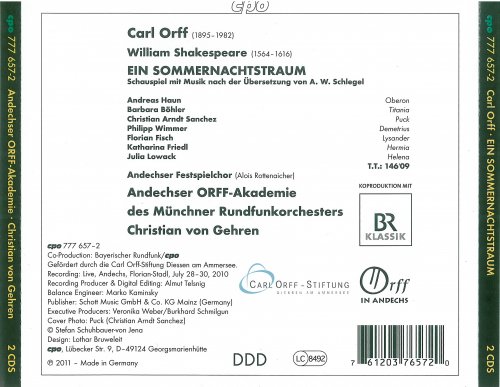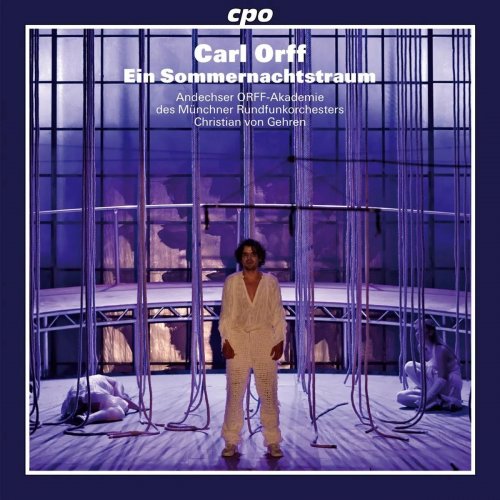
Christian von Gehren - Carl Orff: Ein Sommernachtstraum (2011)
BAND/ARTIST: Christian von Gehren
- Title: Carl Orff: Ein Sommernachtstraum
- Year Of Release: 2011
- Label: CPO
- Genre: Classical
- Quality: FLAC (image+.cue,log,scans)
- Total Time: 02:25:46
- Total Size: 733 MB
- WebSite: Album Preview
Tracklist:
CD1:
Erste Szene: Im Palaste des Theseus
01. Introduktion
02. Dialog
03. Melodram
04. Dialog
05. Melodram
Zweite Szene
06. Rupelszene
07. Dialog
Dritte Szene: Ein Wald bei Athen
08. Melodram
09. Melodram
10. Dialog
Vierte Szene
11. Melodram
12. Dialog
13. Melodram
14. Melodram
Funfte Szene
15. Dialog
16. Melodram
17. Lied
CD2:
Sechste Szene
01. Dialog
02. Melodram
03. Dialog
04. Melodram
05. Melodram
06. 'Mondaufgang'
Siebente Szene
07. Melodram
08. Melodram
09. 'Morgengrauen'
10. Dialog
11. Melodram
12. Melodram
Achte Szene
13. Dialog
14. Marsch
Neunte Szene: Im Palaste des Theseus
15. Vorspiel
16. Dialog
17. Rupel-Marsch
18. Dialog
19. Lied
20. 'Ein Tanz von Rupeln'
21. 'Mitternacht'
22. Finale

CD1:
Erste Szene: Im Palaste des Theseus
01. Introduktion
02. Dialog
03. Melodram
04. Dialog
05. Melodram
Zweite Szene
06. Rupelszene
07. Dialog
Dritte Szene: Ein Wald bei Athen
08. Melodram
09. Melodram
10. Dialog
Vierte Szene
11. Melodram
12. Dialog
13. Melodram
14. Melodram
Funfte Szene
15. Dialog
16. Melodram
17. Lied
CD2:
Sechste Szene
01. Dialog
02. Melodram
03. Dialog
04. Melodram
05. Melodram
06. 'Mondaufgang'
Siebente Szene
07. Melodram
08. Melodram
09. 'Morgengrauen'
10. Dialog
11. Melodram
12. Melodram
Achte Szene
13. Dialog
14. Marsch
Neunte Szene: Im Palaste des Theseus
15. Vorspiel
16. Dialog
17. Rupel-Marsch
18. Dialog
19. Lied
20. 'Ein Tanz von Rupeln'
21. 'Mitternacht'
22. Finale
Carl Orff's "play with music" Ein Sommernachtstraum is based on a German translation of A Midsummer Night's Dream. It's a work with a troubled history, based nearly as much on the dubious political circumstances surrounding its creation as on its inherent musical value. Orff had written music for parts of the play as early as 1917, but it wasn't until 1938 when he accepted a commission from the National Socialist mayor of Frankfurt to write incidental music to replace Mendelssohn's contaminated Jewish score that he created the full work. (The version recorded here is a 1964 expansion that the composer produced to celebrate the 400th anniversary of Shakespeare's birth.) Regardless of Orff's motivation for colluding with the malign intent of the Nazi Party, the piece is of scant musical interest. It consists of the entire text of the play with very sparse, fleeting injections of music, most of which come and go before they can make much of an impression. Most of the music that lasts long enough to register in the listener's consciousness involves direct quotes from the composer's earlier works, which may have succeeded in their original contexts but often come across here as miscalculated, or, in the case of the too-frequently iterated "Rüpelszene" (lifted from Die Kluge), as excruciatingly trivial. There are a handful of effective musical moments such as the end of the love scene with Titania and Bottom and the opening of the last scene. Even for Orff's most ardent fans, his paltry level of invention makes this a work unlikely to generate much enthusiasm.
Since the recording has so little music and consists primarily of the play itself, its effectiveness depends largely on the quality of the acting. The performances are generally so passive and uninflected that, were it not for the fact that the recording was taken from a certified live performance, the listener might reasonably be excused for assuming these were members of an amateur theater group doing a first table-reading of the script. Several of the actors occasionally sound like they are getting worked up, but to little ultimate effect. Most egregious is the affectless performance of the actor playing Bottom, who for most of the play sounds like he is reading a shopping list, or maybe a recipe. There is little in the actors' delivery, or the pedestrian music, or the tepid response of the audience, to indicate that this is, after all, a comedy.
Since the recording has so little music and consists primarily of the play itself, its effectiveness depends largely on the quality of the acting. The performances are generally so passive and uninflected that, were it not for the fact that the recording was taken from a certified live performance, the listener might reasonably be excused for assuming these were members of an amateur theater group doing a first table-reading of the script. Several of the actors occasionally sound like they are getting worked up, but to little ultimate effect. Most egregious is the affectless performance of the actor playing Bottom, who for most of the play sounds like he is reading a shopping list, or maybe a recipe. There is little in the actors' delivery, or the pedestrian music, or the tepid response of the audience, to indicate that this is, after all, a comedy.

Classical | FLAC / APE | CD-Rip
As a ISRA.CLOUD's PREMIUM member you will have the following benefits:
- Unlimited high speed downloads
- Download directly without waiting time
- Unlimited parallel downloads
- Support for download accelerators
- No advertising
- Resume broken downloads


